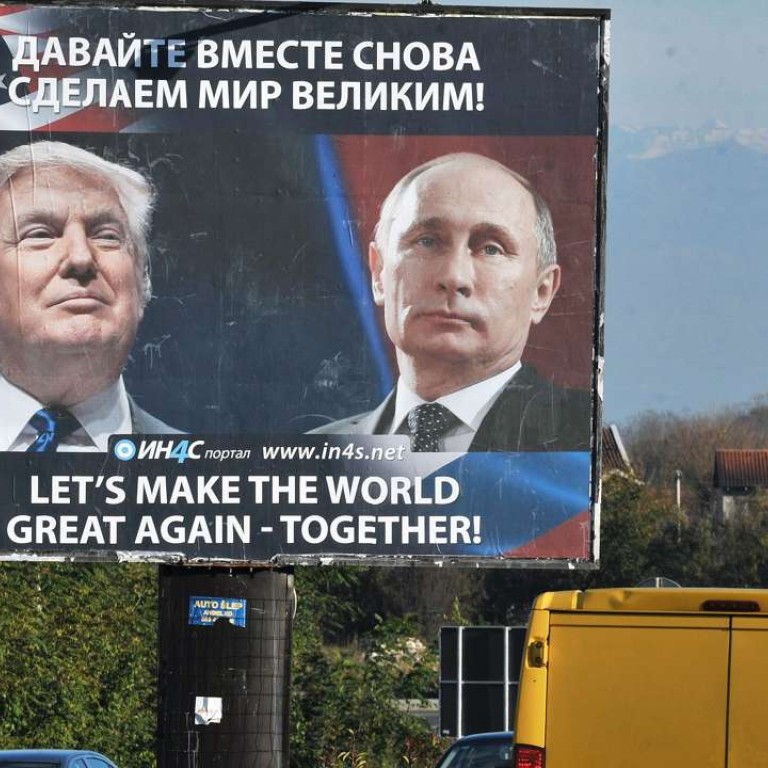
China’s pragmatic approach to Trump’s victory is a worthy lead for others to follow
Keyu Jin sees Confucian wisdom in China’s prudently neutral response to Trump’s winning the White House, as bilateral relations are unlikely to be fundamentally transformed
Yet, prudence flows through China’s Confucian veins. Rather than jump to conclusions about future US policies, much less take premature action, China’s leaders have remained neutral in their response to Trump’s victory. They seem confident that, though the relationship will change somewhat, it will not be fundamentally transformed. It will still be neither very good nor very bad.

Under Donald Trump, the US will accept China’s rise – as long as it doesn’t challenge the status quo
It helps that Trump has all but ceased China-bashing since his victory. Instead, he posted on Twitter a video of his granddaughter reciting a poem in Putonghua, which became an instant hit in China. Whether intended explicitly as a message to China or not, the move highlighted the possibility of a difference between Trump’s campaign rhetoric and his actual positions and plans.
Trump on Asia: what he’s said and where he stands
If Chinese imports were blocked, prices would rise, undermining consumption, impeding economic growth and worsening inequality. And the US would not be protected from manufacturing job losses either, as these would just go to Vietnam or Bangladesh, where labour costs are even lower than in China nowadays.
There is a gap between rhetoric and reality, and no radical change should be expected
The same goes for investment flows – the second engine of globalisation – often conveniently forgotten in discussions of the US-China economic relationship. China is one of the biggest buyers of US Treasuries, and continues to finance US consumption and investment. China may even help finance the large infrastructure projects that Trump has promised, thereby reducing pressure on the US budget. So Trump is unlikely to change much in terms of US economic policy, at least if he knows what’s good for him. Where he might make some changes is in foreign policy; but those changes may be more likely to please China than to aggravate it.
The Obama administration has for years been engaged in a strategic rebalancing towards Asia. At a time when China was rapidly accumulating both economic and military strength, Obama seemed committed to containing its rise as best he could, including by involving the US in territorial disputes in the South China Sea.

Why China’s best response to Trump is to drive consumption, boost household incomes
By contrast, Trump, with his “America first” approach to foreign policy, has paid little attention to the South China Sea dispute. That works just fine for China, which would welcome less US involvement in Asia, in the South China Sea in particular, as well as in Taiwan.
If Trump follows through on his pledge to mend fences with Russia, the odds that China will escape US pressure would lengthen further
But here, too, there is a gap between rhetoric and reality, and no radical change should be expected. Soon after being elected, Trump assured Japan and South Korea of America’s commitment to their security, despite a campaign vow to demand more payment for US protection. Add to that the threat posed by North Korea, and a destabilising US strategic retreat from Asia remains highly unlikely.
If Trump follows through on his pledge to mend fences with Russia, the odds that China will escape US pressure would lengthen further. Without Russia to deal with, the US would have even more time to dedicate to Asian affairs. Moreover, a warming of the Russia-US relationship could lead to subtle changes in the Russia-China relationship, which has deepened since Russia’s annexation of Crimea wrecked its relations with the West.
Trump expected to welcome Chinese investment in US, despite threatening tough tariffs on country’s products
Trump’s victory is far from inconsequential. He is no ordinary US president, and he must be taken seriously, though not literally, to borrow a phrase from The Atlantic’s Salena Zito. But, as China’s leaders seem to recognise, he will have little choice but to colour mostly inside the lines as president. Even if he wants to deviate from the foreign-policy consensus, the US system limits his ability to do so.
So, rather than worrying about Trump’s personal predilections or trying to predict the unpredictable, China’s leaders are focused on what is really important: the need for a cooperative bilateral relationship. Other world powers should do the same.
Keyu Jin, a professor of economics at the London School of Economics, is a World Economic Forum Young Global Leader. Copyright: Project Syndicate

